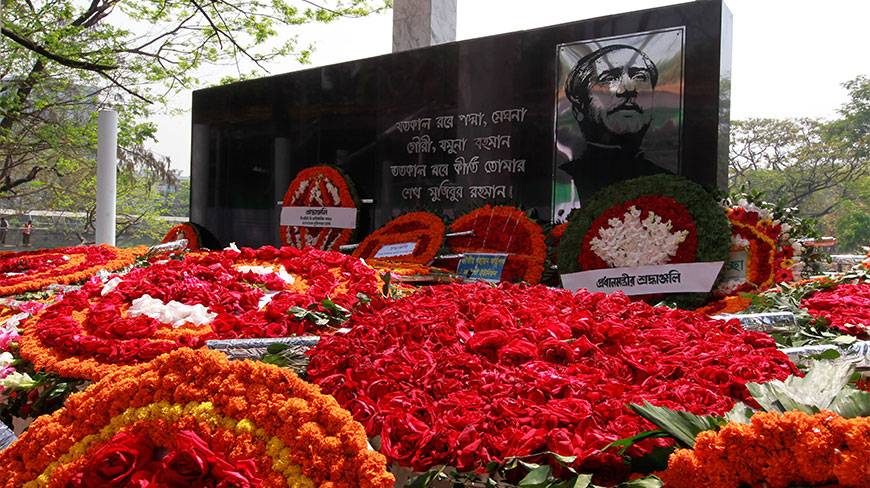Ambassador Abdul Monem, the Bangladesh permanent representative at the United Nations, invited me to accept an award at his mission quarters in New York as part of the celebration of the 94th anniversary of the birth of Sheikh Mujibur Rahman on St Patrick’s Day (March 17).
As a result, I now have a shiny plaque that proclaims I am an “eminent journalist,” because of my reporting for the Associated Press during Bangladesh’s liberation war in 1971. And the AP thought I was just doing my job!
Also, I was therefore able to share the Bangladesh UN mission’s feast of curry, nan, dal, spicy cauliflower, and tandoori chicken, as well as a huge chocolate birthday cake, while elsewhere in New York the Irish and Irish-for-the-day had to be content with drinking green beer and eating the St Patrick’s day traditional corned beef and cabbage.
Lawrence Lifschultz, who doesn’t need a plaque to designate him as an eminent journalist, was also honored. He has written books and articles insightful about Bangladesh and other subjects. We had never met. The opportunity to chat about our Bangladesh experience made the evening special for me.
I am not so sure Sheikh Mujib would have approved of my award. I last saw him some time in late 1974 or early 1975, in the last year of his life, when he passed through Manila. I was an AP correspondent in Manila back then. When he saw me among the journalists at Manila airport, he pointed me out to his host, Philippines President Ferdinand Marcos, and said, “Watch this man. He is very dangerous.”
Three months after Mujib was killed in August 1975 in Dhaka (a dire event I covered until the government threw me out), Marcos threw me out of the Philippines, giving me a record of being expelled by two different Asian governments in less than 90 days.
The recent occasion at the Bangladesh mission was an opportunity to reminisce about Mujib as well as to briefly discuss his legacy.
Lifschultz also spoke. He detailed the American involvement in the coup in which Mujib was murdered, an association he discovered after much investigation. After our talks, the subject was the central part of a Q&A with the predominantly Bengali audience who filled the UN mission’s meeting hall.
It was at this point that Lawrence and I disagreed. I tend to discount a shady direct American involvement in that coup, partly because I have heard so often in Bangladeshi living rooms Bengalis whining about American, Indian, Chinese, and Russian conspiracies victimising the hapless Bangladesh. I believe conspiracy theory talk stems from a denial of Bangladesh’s responsibility for its own fate. Disastrous wounds in Bangladesh’s history (and there have been too many) have been mostly self-inflicted.
Lawrence did point out as evidence for his argument examples of the CIA’s behind-the-scenes presence in such coups as in Iran, Guatemala, and Chile. I’ve seen much the same CIA activity myself in the Congo and, of course, along the Pakistan-Afghan border.
I concluded that Mujib’s legacy was an independent Bangladesh, with all its faults and its promise. Bangladesh’s more exuberant performance since it split from Pakistan has more than substantiated the claims of Bengalis that they had been suppressed by West Pakistan and the central government, especially when you look at the mess Pakistan has made of itself since then.
Accessible and generous as he was – to a fault in both cases – Mujib left a darker side that is once more endangering the land he so loved. His grab for total power under a one-party Baksal led to his death and a spiraling into military dictatorship that took decades to halt. The same drive for power ended the lives of two other politicians closely identified with the independence of Bangladesh – Zulfiqar Ali Bhutto (hanged in 1977) and Indira Gandhi (assassinated in 1984).
The country is now in the midst of a political crisis arising out of a foolish boycott by the BNP, which has given almost untrammeled power to Mujib’s daughter, Prime Minister Sheikh Hasina, leading toward what could be called a “one-person” rule.
I told the Bengali audience at the UN mission that I preferred to have opposition party leaders in the parliament house instead of being in jail. I have spent too much time over the years trying to help friends jailed for politics.
That St Patrick’s morning, I received a message from Moudud Ahmed that I read out loud to Ambassador Monem. Moudud wrote:
“Let people know that there is no democracy in Bangladesh. I had to be in jail for three months recently only for making political statements. So I have stopped talking. I [went] to jail in 1955 at the age of 16 in the language movement, and led the ‘Independent East Pakistan Movement’ in England in mid-sixties, and organised the defence of Sheikh Mujibur Rahman in the Agartala Conspiracy Case, and took part in the war of liberation, [only] to see a Bangladesh where I cannot criticise the government freely for fear of being arrested and have an unelected government run without any accountability to people.”
Mujib also left the beginning of a legacy of insular family politics that also contributed to his death, and has led to gridlocking at the highest levels of the government. Now we have ruling mothers seeking a repeat of bad history by seemingly grooming their sons, Joy and Tarique, as successors. They threaten to turn the patriotic cry of “Joy Bangla,” to “Joy Tarique.”
Source: UNBConnect










